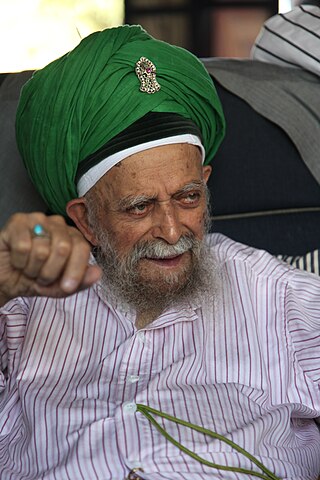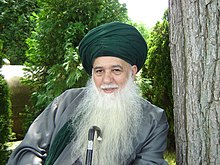The Islamic Supreme Council of America (ISCA) is a Muslim religious organization in the United States, founded in 1998 by Shaykh Hisham Kabbani, who is also its current chairman. The council describes itself as "dedicated to educating Muslims and non-Muslims alike, and developing good citizenry through the teaching of moral excellence".

The Naqshbandi order is a Sufi order of Sunni Islam named after Baha al-Din Naqshband. They trace their silsila (chain) to the Islamic prophet Muhammad through the first caliph Abu Bakr by the way of Muhammad ibn Abi Bakr and Ja'far al-Sadiq.

Al-Qāsim ibn Muḥammad ibn Abī Bakr was a jurist in early Islam.

Abdullah ad-Daghistani, commonly known as Shaykh Abdullah, was a North Caucasian Sufi shaykh of the Naqshbandi-Sufi order.
Mawlana Khâlid Sharazuri also known as Khâlid-i Baghdâdî and Mawlana Khalid (1779–1827) was a Kurdish Sufi, and poet by the name of Shaykh Diya al-Dīn Khalid al-Shahrazuri, the founder of a branch of the Naqshbandi Sufi order - called Khalidi after him - that has had a profound impact not only on his native Kurdish lands but also on many other regions of the western Islamic world. His writings are among the earliest examples of prose and poetry in Central Kurdish.
Owais al-Qarani, also spelled Uways or Owais, was a Muslim from South Arabia who lived during the lifetime of the Islamic prophet Muhammad.
The First and Second International Islamic Unity Conference were conferences organized by followers of the Naqshbandi Haqqani Sufi Order in Los Angeles (1996) and Washington DC (1998). Sufi and Sufi-friendly Muslim representatives, Islamic scholars and politicians were invited to the conferences. The conferences exemplified the Haqqani-Naqshbandis' ambitions to establish itself as a major player within the American Muslim scene. The conference was supported in part by members of royalty, Muslim political and religious leaders from across the world.

The Uwaisī silsila or tariqa (pathway) is a form of spiritual transmission in the vocabulary of Sufism, named after Owais al-Qarani. It refers to the transmission of spiritual knowledge between two individuals without the need for direct interaction between them.

Naqshbandiyya Khalidiyya, Khalidiyya or Khalidi is the title of a branch of the Naqshbandiyya Sufi lineage, from the time of Khâlid-i Shahrazuri until the time of Shaykh Ismail ash-Shirwani.

Naqshbandi Haqqani Sufi Order, stems from the Naqshbandi 'Aliyyah Tariqah. It takes the name "Haqqani" from the tariqah's revivor, Mawláná Shaykh Muḥammad Nazım 'Ádil al-Haqqani. The Naqshbandi-Haqqani Sufi Order of America (NQSOA) is an educational organization devoted to spreading the teachings of the Naqshbandi-Haqqani Sufi tariqah in America, under the guidance of the worldwide leader and master of the order Mehmet 'Ádil ar-Rabbani, Mawláná Shaykh Nazım's successor.

As-Sunnah Foundation of America (ASFA) is an educational organization that works for the unity of the Islamic faith in the United States, founded and chaired by Hisham Kabbani. Founded in 1997, together with the Islamic Supreme Council of America (ISCA), the ASFA has close connections to Kabbani's Naqshbandi Haqqani Sufi Order. The ASFA is said be a main organization of Nakshbandi Sufi order in America.
Sayyad Laal Shah Hamdani was an Islamic scholar and prominent Sufi shaykh of Naqshbandi tariqah in South Asia.

Shaykh Muhammad Nazim Adil Al-Qubrusi Al-Haqqani, commonly known as Shaykh Nazim, was a Turkish Cypriot Sunni Muslim imam and one of the most influential members of the Haqqani stream of the Naqshbandi order (tariqa) of Sunni Islam.
The Golden Chain of Naqshbandi Haqqani Sufi Order is a lineage of Sufi masters of the Naqshbandi 'Aliyyah branch.
The Al-Mustafa Islamic Cultural Centre Ireland, which started its activities as Clonee Mosque, based in the village of Clonee, is the mainstream and leading Islamic Centre in Dublin 15, Ireland. It was established in January 2004 as Clonee Mosque, to act as a place of worship for the Muslim community in Clonee and surrounding areas of Dublin 15.
Gibril Fouad Haddad is a Lebanese-born Islamic scholar, hadith expert (muhaddith), author, and translator of classical Islamic texts. He was featured in the inaugural list of The 500 Most Influential Muslims and has been called "one of the clearest voices of traditional Islam in the Western world", a "prominent orthodox Sunni" and a "staunch defender of the traditional Islamic schools of law." He holds ijazas from over 150 scholars across the Muslim world. He was a visiting fellow (2013-2015) then senior assistant professor (2015-2018) at the Sultan Omar Ali Saifuddin Center for Islamic Studies, Universiti Brunei Darussalam. He is also a staunch critic of Wahhabism and Salafism.

Shaykh Mehmet 'Ádil was born on 29 March 1957 in Damascus, Shām. He is the successor and oldest son of Sultan-ul 'Awliyá Sheikh Muhammad Nazim 'Ádil al-Haqqání and Hajjah Amina 'Ádil Sultan Hánim, and the current spiritual leader (grandshaykh) of the Haqqani branch of the Naqshbandi Sufi order.

Mohammad Baba as-Samasi was a Sufi of the Naqshbandi order. He was born in Sammas, a village on the outskirts of Ramitan, three miles (4.8 km) from Bukhara, Uzbekistan. He memorized the Qur'an and the Hadith, and become an expert in Jurisprudence, then studied Speculative Theology, Logic, Philosophy and History. He followed Shaykh Ali Ramitani. Shaykh 'Ali Ramitani chose him as his successor before his death and ordered all his disciples to follow him.

Yaʿqūb ibn ʿUthmān ibn Maḥmūd al-Charkhī was a Naqshbandi Sufi pir and student of Khwaja Sayyid Alauddin Atar. Yaqub Charkhi was born in 762, in a village called Charkh in Logar, Afghanistan AH and died in 851. He was a Sufi master and also a reputed Islamic scholar.









